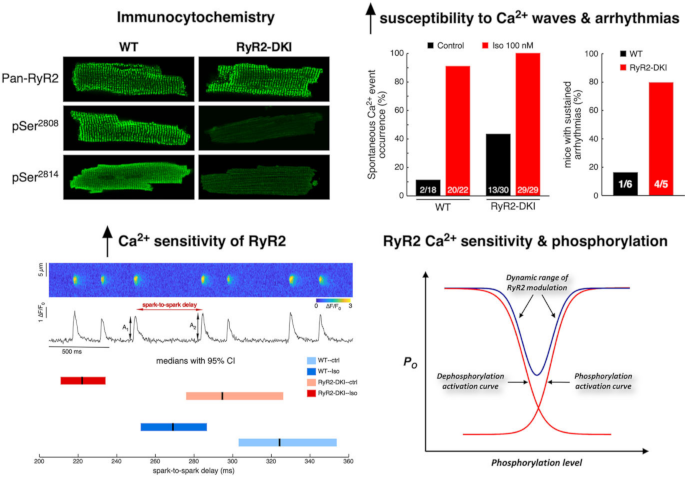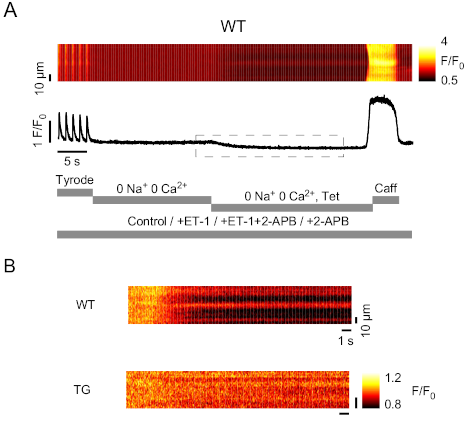Perspectives
Perspectives from
S. Hamilton, D. Terentyev. The yellow brick road to understanding the RyR2 signalosome. J. Physiol. 2024 DOI
highlighting our paper

Dual ablation of the RyR2-Ser2808 and RyR2-Ser2814 sites increases propensity for pro-arrhythmic spontaneous Ca2+ releases. J. Physiol. 2024 DOI pdf
Perspectives from
V. Algalarrondo, F. Extramiana. Autoimmune Atrial Fibrillation or Atrial
Fibrillation–Induced Autoimmunity? A New Atrial
Fibrillation Begets Atrial Fibrillation Pathway?. Circulation 48:499–501, 2023 DOI
highlighting our paper

Autoimmune Atrial Fibrillation. Circulation 2023 DOI
Perspectives from
M. Ben-Johny. Coupled sodium channels: Does it really take two to tango?. J. Physiol. 2023 DOI
highlighting our paper

A detailed analysis of single-channel Nav1.5 recordings does not reveal any cooperative gating. J. Physiol. 2023 DOI
Perspectives from
Lucia Brunello. Autoantibodies that target atrium-specific
potassium channel cause atrial fibrillation. 2023 DOI
highlighting our paper

Autoimmune Atrial Fibrillation. Circulation 2023 DOI
Perspectives from
S. Hamilton, D. Terentyev. RyR2 Gain-of-Function and Not So Sudden Cardiac Death. Circ. Res. 129:417–419, 2021 DOI
highlighting our paper

Impaired Binding to Junctophilin2 and Nanostructural Alteration in CPVT Mutation. Circ. Res. 2021 DOI
Perspectives from
Rengasayee Veeraraghavan, Nicolae Moise and Seth H. Weinberg. Sodium channels and the intercalated disk - it is all about location, location, location. J. Physiol. 2021 DOI
highlighting our paper

Localization of Na+ channel clusters in narrowed perinexi of gap junctions enhances cardiac impulse transmission via ephaptic coupling: a model study. J. Physiol. 1-33, 2021 DOI pdf
Perspectives from
M.L. Munro and P.P. Jones. Too much of a good thing? Establishing a role of excessive RyR2 dephosphorylation in heart disease. J. Physiol. 2020 DOI
highlighting our paper

Activation of endogenous protein phosphatase 1 enhances the calcium sensitivity of the ryanodine receptor type 2 in murine ventricular cardiomyocytes. J. Physiol. 2020 DOI
Perspectives from
P. Kohl. From ion channel to organismic phenotype: An example of integrative translational research into cardiac electromechanics. Heart Rhythm 10(10):1542-3, 2020 DOI
highlighting our paper
Spatial Correlation of Action Potential Duration and Diastolic Dysfunction in Transgenic and Drug-induced LQT2 Rabbits. Heart Rhythm 10(10):1533-1541, 2013 DOI PubMed pdf
Perspectives from
M. Boutjdir and P. E. Lazzerini. A Novel Peptide/Antibody-Based Antiarrhythmic Approach to Long QT Syndrome and Beyond. JACC 2020 DOI
highlighting our paper

Perspectives from
L.A. Hancock , G. Nichol. What Explains Unexplained Cardiac Arrest?. Circ. Arrhythm. Electrophysiol. 141:1775–1777, 2020 DOI
highlighting our paper

Autoantibody signature in cardiac arrest. Circulation 141:1764–1774, 2020 DOI pdf
Perspectives from
A.O. Verkerk , C.A. Remme. Down the Rabbit Hole: Deciphering the Short QT Syndrome. Eur Heart J 40(10):842-853, 2019 DOI
highlighting our paper
Transgenic short-QT syndrome 1 rabbits mimic the human disease phenotype with QT/action potential duration shortening in the atria and ventricles and increased ventricular tachycardia/ventricular fibrillation inducibility. Eur Heart J 7;40(10):842-853, 2019 DOI PubMed
Perspectives from
K.H. Haugaa, M.K. Stokke. Cardiac electrical and mechanical alterations - united in the long QT syndrome. Int J Cardiol 2019 DOI
highlighting our paper
Electro-mechanical (dys-)function in long QT syndrome type 1. Int J Cardiol 274:144-151, 2019 DOI PubMed pdf
Perspectives from
R. Veeraraghavan R, P.B. Radwański. Sodium channel clusters: harmonizing the cardiac conduction orchestra. J. Physiol. in press, 2018 DOI
highlighting our paper

Distribution of cardiac sodium channels in clusters potentiates ephaptic interactions in the intercalated disc. J. Physiol. 596:563-589, 2018 DOI pdf
Perspectives from
R.E. Dixon. The anti‐arrhythmic drIP3 from a leaky SR. J. Physiol. 596.18 (2018) pp 4291–4293, 2018 DOI
highlighting our paper

Obstruction of ventricular Ca2+ ‐dependent arrhythmogenicity by IP3‐ triggered SR‐Ca2+ release. J. Physiol. 596.18:4323–4340, 2018 DOI
Perspectives from
Kuljeet Kaur, PhD; José Jalife, MD. Is TGF-β1 (Transforming Growth Factor-β1) an Enabler of Myofibroblast–Cardiomyocyte Cross Talk?. Circ. Arrhythm. Electrophysiol. 10:e005289, 2017 DOI
highlighting our paper

TGF-β1 (Transforming Growth Factor-β1) Plays a Pivotal Role in Cardiac Myofibroblast Arrhythmogenicity. Circ. Arrhythm. Electrophysiol. 10(5):e004567, 2017 DOI
Perspectives from
G. Gabbiani. . F1000Prime 2017 DOI
highlighting our paper

TGF-β1 (Transforming Growth Factor-β1) Plays a Pivotal Role in Cardiac Myofibroblast Arrhythmogenicity. Circ. Arrhythm. Electrophysiol. 10(5):e004567, 2017 DOI
Perspectives from
E. Arbelo. Another piece of the puzzle: Assessment of mechanical dispersion by magnetic resonance in long QT syndrome. Heart Rhythm 14(9):1398-99, 2017 DOI
highlighting our paper
Phase contrast MRI reveals regional, transmural, and base-to-apex dispersion of mechanical dysfunction in LQTS patients. Heart Rhythm <span class="bold">14(9):1388-1397, 2017 DOI PubMed pdf
Perspectives from
Jamie I. Vandenberg and Adam P. Hill. An ‘alternans’ way to quantify arrhythmogenic substrates. J. Physiol. 594.9 (2016):2375–2376, 2016 DOI
highlighting our paper
Stochastic pacing reveals the propensity to cardiac action potential alternans and uncovers its underlying dynamics. J. Physiol. Epub, 2016 DOI
Perspectives from
M.H. Gollob. Toward Translation of Genomic Discovery to Clinical Efficacy in Atrial Fibrillation. JACC 68(17), 2016 DOI
highlighting our paper

Perspectives from
Jasmine R. Dickinson, Grégory Scherrer. Enhanced Dendritic Integration by Ih Reduction in the Anterior Cingulate Cortex Increases Nociception. Neuron 86:4-6, 2015 DOI
highlighting our paper
Dysfunction of Cortical Dendritic Integration in Neuropathic Pain Reversed by Serotoninergic Neuromodulation. Neuron 86:233-246, 2015 DOI
Perspectives from
Mei-ling Anne Joiner. NO generation by β-AR stimulation to activate CaMKII. Cardiovasc. Res. 100:352-353, 2013 DOI
highlighting our paper
NO-dependent CaMKII activation during β-adrenergic stimulation of cardiac muscle. Cardiovasc. Res. 100:392-401, 2013 DOI
Perspectives from
A.J. Moss. Sex Hormones and Ventricular Tachyarrhythmias in LQTS: New Insights Regarding Antiarrhythmic Therapy . Heart Rhythm 9(5):833-834, 2012 DOI
highlighting our paper
Estradiol Promotes Sudden Cardiac Death in Transgenic Long-QT Type 2 Rabbits while Progesterone is Protective. Heart Rhythm 9(5):823-32, 2012 DOI PubMed pdf
Perspectives from
Wei Wang and Xander H.T. Wehrens. Stress synchronizes calcium release and promotes SR calcium leak. J. Physiol. (Lond). 391-392, 2010 DOI
highlighting our paper
Increased Ca2+ leak and spatiotemporal coherence of Ca2+ release in cardiomyocytes during β-adrenergic stimulation. J. Physiol. (Lond). 588.1:225-242, 2010 DOI
Perspectives from
Thomas R. Shannon. Ryanodine receptor Ca2+ sensitivity and excitation-contraction coupling in muscular dystrophy and heart failure: similar and yet different. AJP Heart Physiol 297:H1965-H1966, 2009 DOI
highlighting our paper
Hypersensitivity of excitation-contraction coupling in dystrophic cardiomyocytes. AJP Heart Physiol 297:H1992-H2003, 2009 DOI
